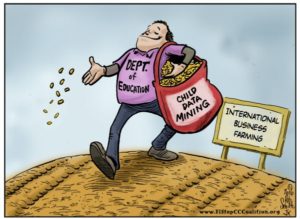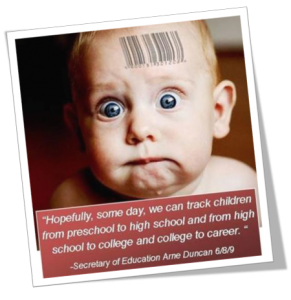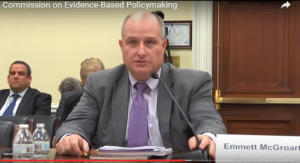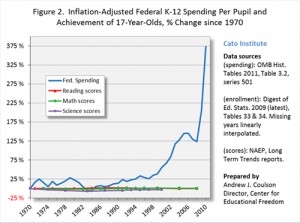ELW Written Testimony for the Commission on Evidence-Based Policymaking
The Commission on Evidence-Based Policymaking (CEP) held its third public hearing on February 9th. This is the organization put into place after President Obama signed a bill authored by Speaker Paul Ryan. CEP is hearing testimony and being urged to recommend lifting the prohibition on a student-unit record system and other issues in order to make longitudinal data on individual American citizens more accessible to government agencies and researchers. Emmett McGroarty of the American Principles Project previously testified about the dangers of this idea.
All of the written and audio information from that hearing is available HERE. Dr. Effrem’s written testimony is available on that page at this link.
After covering the lack of constitutionality, the dangers inherent in the strong likelihood that subjective social emotional data will be added, the already large amount of evidence that government education programs are very ineffective, and that data security in the US Department of Education is very weak, these were her recommendations:
1. Retain the prohibition of a student unit-record system.
2. Strongly consider a moratorium on further federal research until programs already shown to be ineffective and harmful are transformed or eliminated and until effective measures are actually implemented.
3. Prohibit social emotional data-gathering and the use of data for predictive testing in the FERPA and Strengthening Education Through Research Act (SETRA) reauthorizations.
4. Put in strict data-transparency language and update the data-security language per the recommendations of technical experts like Dr. Joel Reidenberg or Barmak Nassirian in any FERPA reauthorization.
5. Require third-party software and testing vendors to notify parents of what data is collected on students and how it is used.
6. Find a way for students whose identity and privacy is compromised to be compensated, in addition to penalizing researchers or private vendors that breach data-security.
7. Close the curriculum and assessment loophole for invasive surveys in the Protection of Pupil Rights Amendment.
8. Demand that the US Department of Education immediately repair the federal data-security failures found in the Inspector General’s recent report and uncovered by the House Oversight Committee.
It will be important to monitor the recommendations of this commission to Congress and to speak out against any suggestions harmful to citizen, and especially student, data and psychological privacy. Stay tuned.
Urgent! Submit Comments Against Global Pre-K SEL Data Mining
Please submit comments before MIDNIGHT, MONDAY 2/13 opposing this latest global taxpayer funded psychological data mining scheme of our youngest children for invasive, ineffective, and harmful government pre-K programs at the federal register. It can be as short as:
I oppose this latest study because there are already dozens of studies showing that preschool is minimally effective, that beneficial effects fade with time or is academically and emotionally harmful. Social emotional assessment, especially for young children, is extraordinarily subjective and unreliable, violates parental autonomy, and the private right of conscience of free American citizens. This is especially true when data security within the U.S. Department of Education is so poor.
You can also do something more in depth. Here are details:
The federal government is joining with the globalists at the Organization for Economic Cooperation and Development (OECD) in a new study that seeks to expand social emotional data gathering (psychological profiling) on our very youngest children, collect sensitive family information and try yet again to show that preschool is effective when there are so many studies to the contrary. Here is the pertinent language from the federal register notice:
FR Doc No: 2016-29749
Abstract: The International Early Learning Study (IELS), scheduled to be conducted in 2018, is a new study sponsored by the Organization for Economic Cooperation and Development (OECD), an intergovernmental organization of industrialized countries. In the United States, the IELS is conducted by the National Center for Education Statistics (NCES). The IELS focuses on young children and their cognitive and non-cognitive skills and competencies as they transition to primary school. The IELS is designed to examine: children’s early learning and development in a broad range of domains, including social emotional skills as well as cognitive skills; the relationship between children’s early learning and children’s participation in early childhood education and care (ECEC); the role of contextual factors, including children’s individual characteristics and their home backgrounds and experiences, in promoting young children’s growth and development; and how early learning varies across and within countries prior to beginning primary school. In 2018, in the participating countries, including the United States, the IELS will assess nationally-representative samples of children ages 5.0-5.5 years (in kindergarten in the United States) through direct and indirect measures, and will collect contextual data about their home learning environments, ECEC histories, and demographic characteristics.
We have warned for years of the dangers and ineffectiveness of both government preschool programs and the indoctrination and profiling inherent in social emotional learning. This study combines the worst of both. Here is our bullet list of why this study should be opposed:
1) According to this compilation of over two dozen studies, there is already plenty of evidence that, at best, preschool is only minimally effective and there is significant evidence that these programs cause academic and emotional harm.
2) With so much evidence of ineffectiveness and harm, there is no reason to embark on yet another study at taxpayer expense.
3) This data gathering is unconstitutional – There is no constitutional, statutory or moral authority for the federal government to create standards and norms for the attitudes, values and beliefs, for innocent American citizens, conduct psychological research on them and to keep this data in perpetuity in federally mandated state longitudinal databases that according to this proposal are going to be shared with a large international agency with unknown data privacy protection standards.
4) It goes against several Supreme Court precedents affirming parent’s inherent rights to direct the education and upbringing of their children.
5) These types of standards and questions are highly subjective, especially when used for young children, as admitted by leading experts and organizations in the fields of education and mental health.
6) Overworked, untrained teachers essentially become psychotherapists to their classrooms of patients.
7) There is a clear link to Common Core and potential for both indoctrination and danger to student and family freedom of conscience covering such controversial topics as climate change, Buddhist mindfulness techniques, social justice, transgenderism and the LGBT agenda.
8) Because of the weak and gutted federal privacy law, the Family Educational Rights and Privacy Act (FERPA), this very sensitive data can be shared with various agencies of the federal government and third parties and re-disclosed and used for “predictive tests,” which are notoriously subjective and inaccurate. Data may then well be used to make life altering decisions for children affecting college entrance, employment, etc.
9) According to information uncovered by the US House Oversight and Government Reform Committee hearings, the state of data security at the US Department of Education is appallingly bad, so this sensitive data, that the government should not have in the first place, is not safe from hackers. We have no idea what the data protection situation is at OECD.
Last Chance to Comment on Student Data Dossiers
The deadline to post comments for the Commission on Evidence-Based Policymaking against the idea of what will turn into a lifelong womb to tomb data dossier on children is midnight TONIGHT!
Please submit even a short comment HERE along the lines of:
“I oppose lifting the prohibition on the student unit-record due to privacy and constitutional concerns.”
If you want more information to expand your comments, please see this link and this one by Christel Swasey.
Thank you!
McGroarty Testifies Against Expanded College-Workforce Data Dossier
Karen R. Effrem, MD – President
Emmett McGroarty, director of education at the American Principles Project testified at the Commission on Evidence-Based Policymaking (CEP) about the highly dangerous idea of creating a longitudinal higher education/workforce database. This plan would lift the ban on this concept currently in federal law. The proposal is being pushed by Florida Senator Marc Rubio in a bill called The Know Before You Go Act, the concerns about which we have discussed before.
Here is the testimony starting at 2:45:48 (Thanks to Shane Vander Hart at Truth in American Education)
Mr. McGroarty gave excellent testimony, as usual, and covered many critical points, especially about how this database would make students/employees subservient to and intimidated by the government, flipping the arrangement put in place by our Founders. The commissioners in their questioning tried to minimize his concerns saying that it would only involve higher education students and would not involve social emotional or “soft” or 21st century skills that is such a concern in pre-K to 12 as we have covered elsewhere. McGroarty held firm and said that these are issues no matter what the grade level of the individual and that the federal government has no constitutional authority to be gathering all of this data on individuals.
We also know that the commissioners arguments were straw man arguments. Corporations and foundations are already very interested in gathering this fuzzy, subjective SEL data on our kids as evidenced by the efforts of the Gates Foundation and the Business Roundtable. And we know that USED has long spoken of wanting to have linkable data on everyone from pre-K through the workforce, so there is no reason that this college workforce would not be eventually be linked to the pre-K through 12 data they are putting together through the state longitudinal database systems.
Here are some additional thought to be added to Mr. McGroarty’s always great testimony on this topic taken from Education Liberty Watch’s response to the March US House Education and Workforce hearing on education research and data collection:
We believe that student privacy and parental consent should always be considered pre-eminent compared to the research desires of the government or private sector, especially in the realm of psychological profiling.
The government has no constitutional, statutory, or moral right to collect data, especially highly personal and sensitive socioemotional data on our children.
According to data presented to this committee by the Cato Institute several years ago, federal involvement in education has yielded either stagnant or declining academic performance:
The vast majority of federal education programs are unconstitutional because the entire US Department of Education is unconstitutional, meaning that most of these programs should be eliminated with any remaining that can be shown to be effective and constitutional programs being block granted to the states.
Many studies showing the ineffectiveness and or harm of current government education and child social programs and the effectiveness of two parent family structure and other non-government academic and social measures are ignored raising the question of why we need so much research in the first place. This includes early childhood and home visiting programs.
We have an opportunity to submit comments to this commission on this and other data privacy related issues by November 14th! Please participate. You may use information from Emmett McGroarty’s testimony, this post and other sources like the Parent Coalition for Student Privacy. Please do not let the federal government create lifelong dossiers on us and our children!
UPDATE: The deadline for comments has been extended to December 14th. Please submit comments and protect the privacy of your children!
Issues
- Assessments + Testing (25)
- Bullying/Sex Education (6)
- Child Protection League (2)
- Common Core Standards (78)
- Curriculum + Standards (65)
- Data Collection and Data Privacy (64)
- Early Education/Nanny State (75)
- Federal Education (128)
- International Education (6)
- LGBT Issues in Education (9)
- Media Appearances (4)
- PL/CBE (2)
- Planned Economy (11)
- Politics of Education (26)
- School Violence (9)
- Social Emotional Learning/Mental Health (52)
- State Education (89)
- Testimony/Presentations (17)
- Uncategorized (13)
- Unions (10)
Education Liberty Watch Projects
ELW Allies
- American Principles Project
- Cato Institute
- Conservative Teachers of America
- Constitutional Coalition
- Eagle Forum
- Minnesota Advocates and Champions for Children
- Missouri Education Watchdog
- Restore Oklahoma Parent Empowerment
- Stop Common Core
- The Pioneer Institute
- Truth in American Education
- What is Common Core – Education Without Representation






